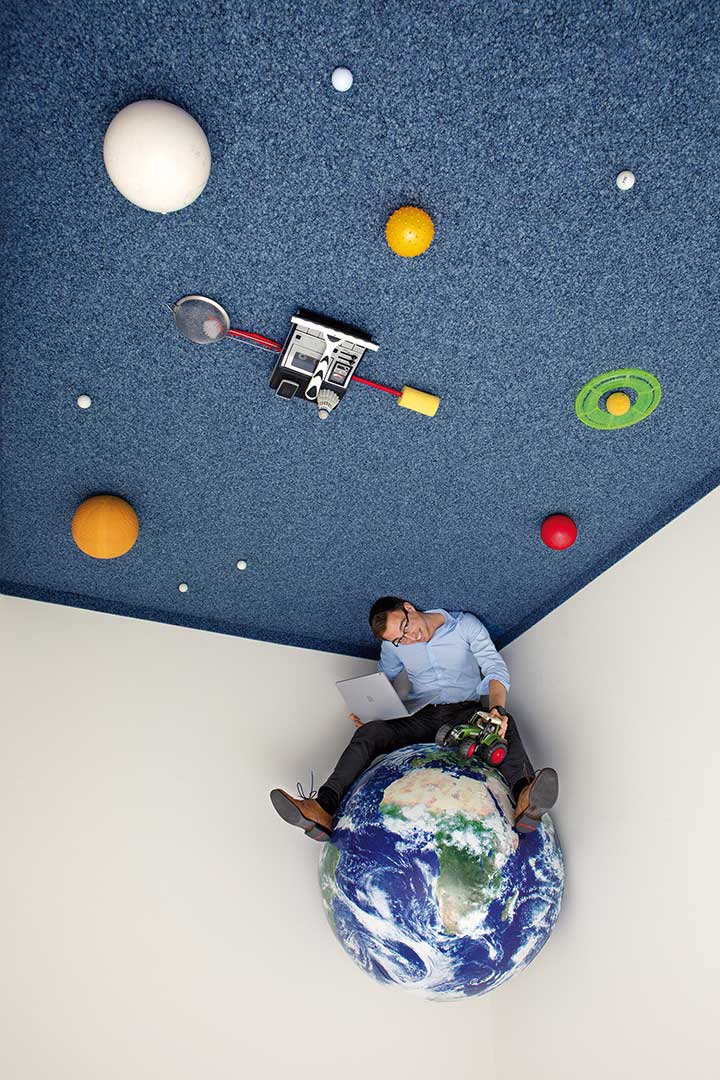Help direct from space

Satellite missions with an important social impact: This was the theme of a competitive tender issued by the European Space Agency in 2017. The tender drew the attention of Marius Bierdel and his colleague Max Gulde from the Fraunhofer Institute for High- Speed Dynamics, Ernst-Mach-Institut, EMI. They decided to apply for the tender, just for fun. More than 200 teams sent in proposals, but despite the stiff competition, Bierdel and Gulde earned a place “on the winner’s podium,” coming in third. “Right then, it became clear to us for the first time that our solution could actually offer significant added value for society,” explains engineer Bierdel. The team intends to apply its technology to help improve efficiency in agriculture, and thus to offer a solution to both the impact of climate change and the threat of food shortages.
Added value for society? No doubt!
This is made possible by a monitoring system that is built into small satellites in order to calculate temperature data with high precision. This sounds straightforward at first, but it packs quite a punch: The data is processed by smart farming companies and detailed information about an area of land can then be conveyed to farmers. Example: “We recommend that you water your fields today and harvest tomorrow.” One effect of climate change is that it is getting more difficult for farmers to base farming tasks on their own previous experience; rather, they need to be prepared for drought and extreme weather events.
In fact, modern satellites already collect this kind of data. However, some satellites are nearly as large as a bus and a single satellite mission can cost up to 800 million euros. Because of this, there are too few available for the task – a satellite might only traverse a farmer’s field once every few weeks. “Breaking down regular data into a per-field basis is essential for agriculture,” states Bierdel. This is where the new technology comes in. The two researchers can minimize the scale of the monitoring instruments to such an extent that they can be carried by smaller satellites the size of a shoe box. “Costs are reduced by a factor of 400 – the data can be calculated daily with a spatial accuracy of under 100 meters,” says Bierdel.
After their success with the ESA tender, the two researchers focused on the question of how to put their idea into practice. Right on time, Fraunhofer Venture was there to help. They received extensive advice through the business acceleration program Fraunhofer runs for young startup founders, including the Fraunhofer Days initiative (FDays for short). “FDays kick-started things off for us – the atmosphere there completely captivated and excited us, as did the idea of founding a startup and being able to make our own decisions,” explains Bierdel. FDays also brought some changes in terms of team members: Christian Mittermaier, whom they got to know there, brought business administration experience to supplement the founder team’s predominantly scientific backgrounds.
ConstellR technology on board the ISS
Thanks to the EXIST startup grant offered by the German Federal Ministry for Economic Affairs and Energy and the Fraunhofer AHEAD program, the founder team was able to secure around two million euros in public funding and further advance Fraunhofer EMI technology. In April 2020, the startup ConstellR was ready for launch. The first major event on the horizon for the team of 19 employees will take place on February 1, 2022, when ConstellR technology will be sent into space — and then operated there for four months together with NASA on the International Space Station (ISS). “In this way we can demonstrate that our systems works in space under real conditions without needing to send up a satellite of our own at this stage,” says Bierdel. The company aims to have their own satellites in 2023 – four in total. “With these, we will be able to monitor as much as ten percent of agricultural land surface worldwide,” he adds with pride.
The enthusiasm of the three founders and their clear roadmap has been highly persuasive to investors, too. Rather than thinking about how much money the small company could gather from investors, on the advice of a mentor at Fraunhofer, the team turned the tables and planned in terms of what exactly they wanted to achieve, and by when. Despite hearing during the first round of financing that “a startup can’t really raise more than 500,000 euros,” the team now has a total of one million euros in investor funding in the bank. Bierdel is excited. “Through ConstellR I can play my part in meeting the challenges of food shortages, the growing global population and climate change. This motivates me tremendously.”